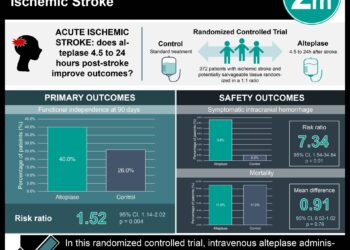Increased risk of stroke and coronary heart disease with long work hours
1. In this systemic review and meta-analysis of cohort studies, long work hours was associated with increased risks of stroke and coronary heart disease.
Evidence Rating Level: 1 (Excellent)
Study Rundown: Long working hours has been associated with increased risks of coronary artery disease and stroke in previous studies, although such studies often had various confounders that limited power of study results – such as interaction between health issues and work hours, as well as publication biases. In this meta-analysis of epidemiological studies, investigators pooled data from 25 published and unpublished studies in the Individual-Participant-Data Meta-analysis in Working Populations (IPD-Work) Consortium and open-access data archives involving more than half a million individuals. In their analyses, long work hours was associated with moderately increased risk of coronary heart disease (RR=1.13), and significantly increased risk of stroke (RR=1.33). The investigators also observed a dose-dependent relationship between work-hours and stroke risk – that is, the longer one works above 40 hours per week, the greater the increase in relative risk for stroke. The study supports efforts to better risk-stratify long work-hour populations for vascular risk factors. The study was strengthened by the large number of individual patients included in the analysis, as well as lack of apparent between-study heterogeneity. A potential limitation would be inclusion of unpublished data from the IPD-Work Consortium, which could have been biased on a convenience and availability bias.
The study had multiple funding sources, listed below:
Medical Research Council, Economic and Social Research Council, European Union New and Emerging Risks in Occupational Safety and Health research programme, Finnish Work Environment Fund, Swedish Research Council for Working Life and Social Research, German Social Accident Insurance, Danish National Research Centre for the Working Environment, Academy of Finland, Ministry of Social Affairs and Employment (Netherlands), US National Institutes of Health, British Heart Foundation.
Click to read the study, published today in The Lancet
In-Depth [meta-analysis]: This meta-analysis included data from 25 published and unpublished studies in the IDP-Work Consortium. Eligible studies were identified from PubMed and Embase from inception to 8/20/2014 with key words related to working hours. Final analyses included 603,838 men and women free from coronary heart disease at baseline and 528,908 men and women free from stroke at baseline.
For coronary heart disease, the mean follow-up time was 8.5 years. Working long hours was associated with a modest increase in risk (RR 1.13, 95% CI 1.02-1.26, p=0.02). There was no significant heterogeneity in the study-specific estimates (I2=0%, p=0.49). No linear dose-dependence was identified between relative risk and increasingly long work hours.
For stroke, the mean follow-up time was 7.2 years. Working long hours was associated with an increased risk of incident stroke (RR 1.33, 95% CI 1.11-1.61, p=0.002). A dose-dependent association was observed between relative risk and increasingly long work hours (RR 1.11 per one category increase, 95% CI 1.05-1.17). Compared to baseline, RR was 1.10 (95% CI 0.94-1.28, p=0.24) for 41-48 working hours, 1.27 (1.03-1.56, p=0.03) for 49-54 hours, and 1.33 (1.11-1.61, p=0.002) for 55 working hours or more per week.
Image: PD
©2015 2 Minute Medicine, Inc. All rights reserved. No works may be reproduced without expressed written consent from 2 Minute Medicine, Inc. Inquire about licensing here. No article should be construed as medical advice and is not intended as such by the authors or by 2 Minute Medicine, Inc.









